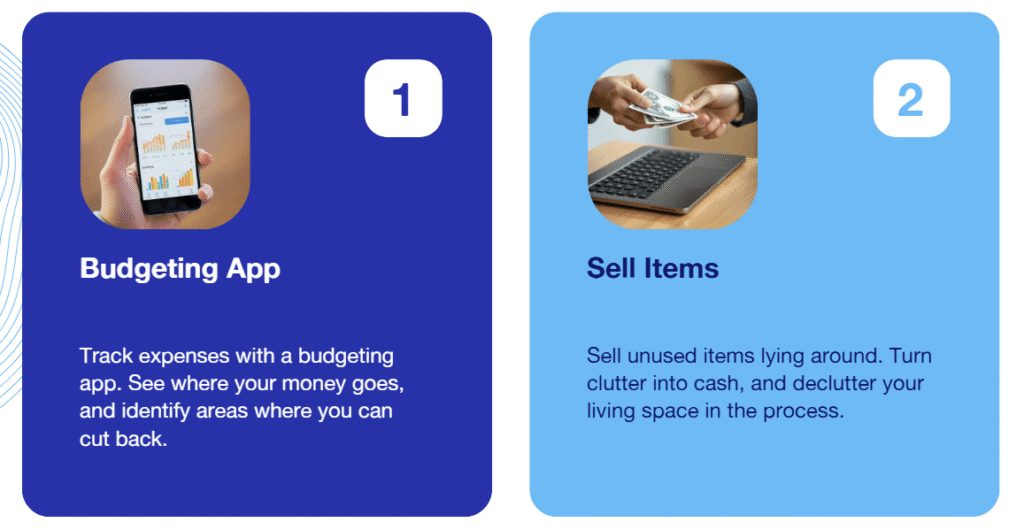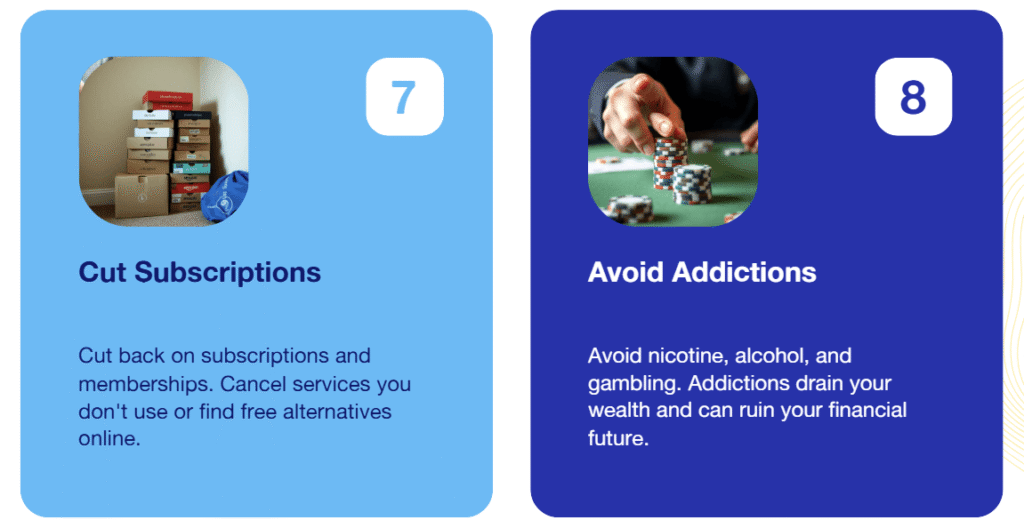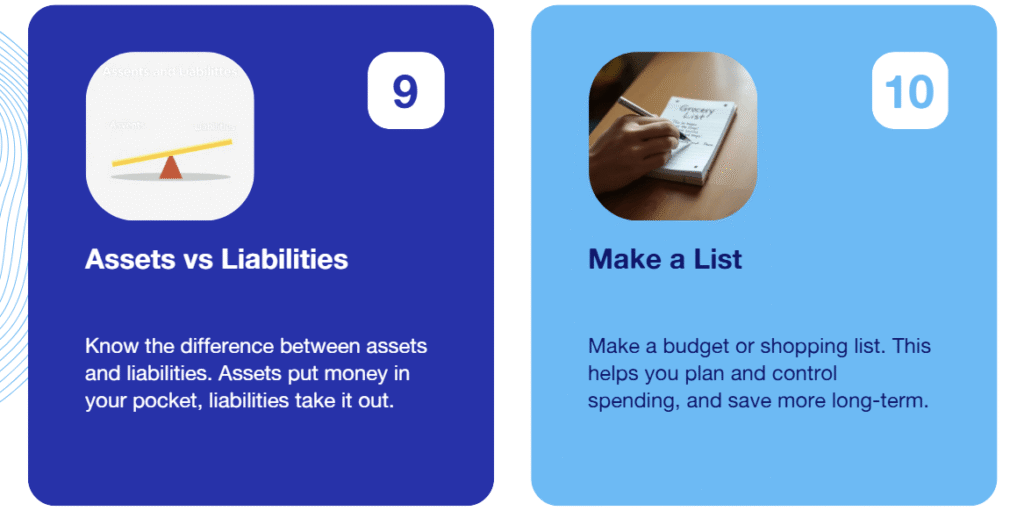10 Easy Ways To Save Money Without Sacrificing Your Lifestyle
Whether you’re a college student, an entrepreneur, or an employee trying to save a lot of money you’re probably doing it the wrong way.
I’ve seen many people save a lot of their money in banks and rely on interest income that’s only 1%. Well hello there, there is an inflation rate that is 10 to 12%, eating your savings account. Tightening your budget and sacrificing your lifestyle will just negatively impact your life.
I’ve come to think about why people are prioritizing expenses instead of raising their assets in order to generate more cash. That’s why many entrepreneurs or students like me are stuck in a 9 to 5 job just to sustain ourselves because they fail to store their valuable assets.
I actually took the time to research 10 ways to save money and get out of debt. Let’s dive into them.

💡 Tip #1: Use a Budgeting App
This helps you manage your expenses and track where most of your money is going.
For example, I use a budgeting app called Wallet, and I found that most of my expenditures came from:
- Food
- Transportation
- Medical expenses
Then I came to a conclusion maybe I’m overspending on something I didn’t realize was actually just a want.
A budgeting app allows me to:
- Track my expenses
- Monitor my cash flow
- Separate my wants, needs, and musts
You don’t need to be a financial nerd to start budgeting. It’s a simple process you can begin at any age.
Yes, tracking expenses every time you buy something can feel tedious, but keep in mind: it will give you a positive return.
💰 Tip #2: Sell Unused Items
If you’re not using your headphones, laptop, or any valuable item, sell it.
By holding on to it, you’re using that asset without any return. Then why holding on to it?
Selling unused items:
- Helps finance your needs
- Declutters your space
- Supports a minimalist lifestyle
- Increases your cash

🛍️ Tip #3: Avoid Impulse Purchases
Impulse purchases happen when consumers buy something instantly, without thinking.
From my own experience on Shopee:
I constantly scrolled through products. When I liked something, I felt the urge to get it now. I ended up buying without considering vouchers or free shipping and it cost a lot.
Controlling this behavior helps you:
- Reduce overspending
- Pay off credit card debts
- Become more financially aware
Bonus: One way to counter impulse buying is covered in Tip #10.
🔌 Tip #4: Save on Utilities
Utilities are monthly recurring payments. If you know how to save on electricity, water, and Wi-Fi bills, you can significantly reduce your expenses.
Simple ways to save:
- Unplug appliances when not in use
- Use energy-efficient devices
- Negotiate Wi-Fi plans
- Turn off lights when not needed (yes, your parents were right!)
Saving on utilities helps both your wallet and the environment.

🧴 Tip #5: Choose Generic Over Branded Products
There’s not much difference between generic and branded products often, they use the same ingredients and offer comparable quality.
The reason branded items cost more:
- Marketing
- Advertising
- Packaging
- Distribution
Especially in medical products, choosing generics can help you save a lot without compromising quality.
🛒 Tip #6: Take Advantage of Vouchers, Cashbacks & Free Shipping
This tip is all about timing.
During sales like Valentine’s Day or Halloween, you can get huge discounts. For example:
If you’re buying shoes that cost $100 and you have a $10 voucher, you just saved $10, now that pair only costs $90.
Utilize:
- Cashback offers
- Free shipping
- Seasonal discounts

🎟️ Tip #7: Cut Back on Subscriptions & Memberships
This includes services like Netflix or monthly software subscriptions.
Ask yourself:
- Are you really using it?
- How often do you use it?
- Is it helping you save time or money?
If not, consider:
- Canceling
- Finding free alternatives online
- Using free trials (I do this a lot!)
Especially for students with limited income, this can make a big difference.
🚭 Tip #8: Avoid Nicotine, Alcohol & Gambling
Here’s a personal story from my father.
He was a mechanical engineer and seaman who traveled the world and got paid 10 to 50 times more than the average worker. But he became broke.
Why? Addiction to gambling, nicotine, and alcohol.
He spent so much on:
- 30 to 50 packs of cigarettes per month
- Gambling expenses
This habit left him working at 4 a.m. every day just to sustain his family. But without financial literacy, he didn’t invest or save.
Let this be a lesson: addictions drain your future wealth.

⚖️ Tip #9: Know the Difference Between Assets and Liabilities
You don’t need to be an accountant to understand this.
- Asset = Puts money into your pocket
- Liability = Takes money out of your pocket
Here’s a story from my own life:
I went to a dental clinic without thinking about the monthly costs of braces. I didn’t evaluate whether I could afford it independently. I was just relying on my mother’s allowance.
That decision became a regret. The monthly $20 adjustment added up.
Always think twice before making a financial decision.
📋 Tip #10: Make a List or a Budget
A budget sets a limit on your spending. It tells you:
- Where your money is going
- How to allocate your resources
- How to plan for a specific time period
If you don’t have a plan, you plan to fail. And if you fail to plan, you fail financially.
Budgeting helps with:
- Forecasting your needs
- Projecting future outcomes
- Saving more in the long term
Final Thoughts
Here are the 10 practical ways I’ve shared to help you save money:
- Use a budgeting app
- Sell unused items
- Avoid impulse purchases
- Save on utilities
- Choose generic over branded
- Use vouchers & cashbacks
- Cut subscription costs
- Avoid addictive spending
- Know assets vs. liabilities
- Make and stick to a budget
🎯 Your Action Plan:
- Download your first free budgeting app today.
- Share in the comments: What are your top 3 money-saving strategies?
- Help others by passing on these tips build discipline, awareness, and financial responsibility, especially if you’re young.
Start now. The earlier you take control of your money, the better your future will be.







